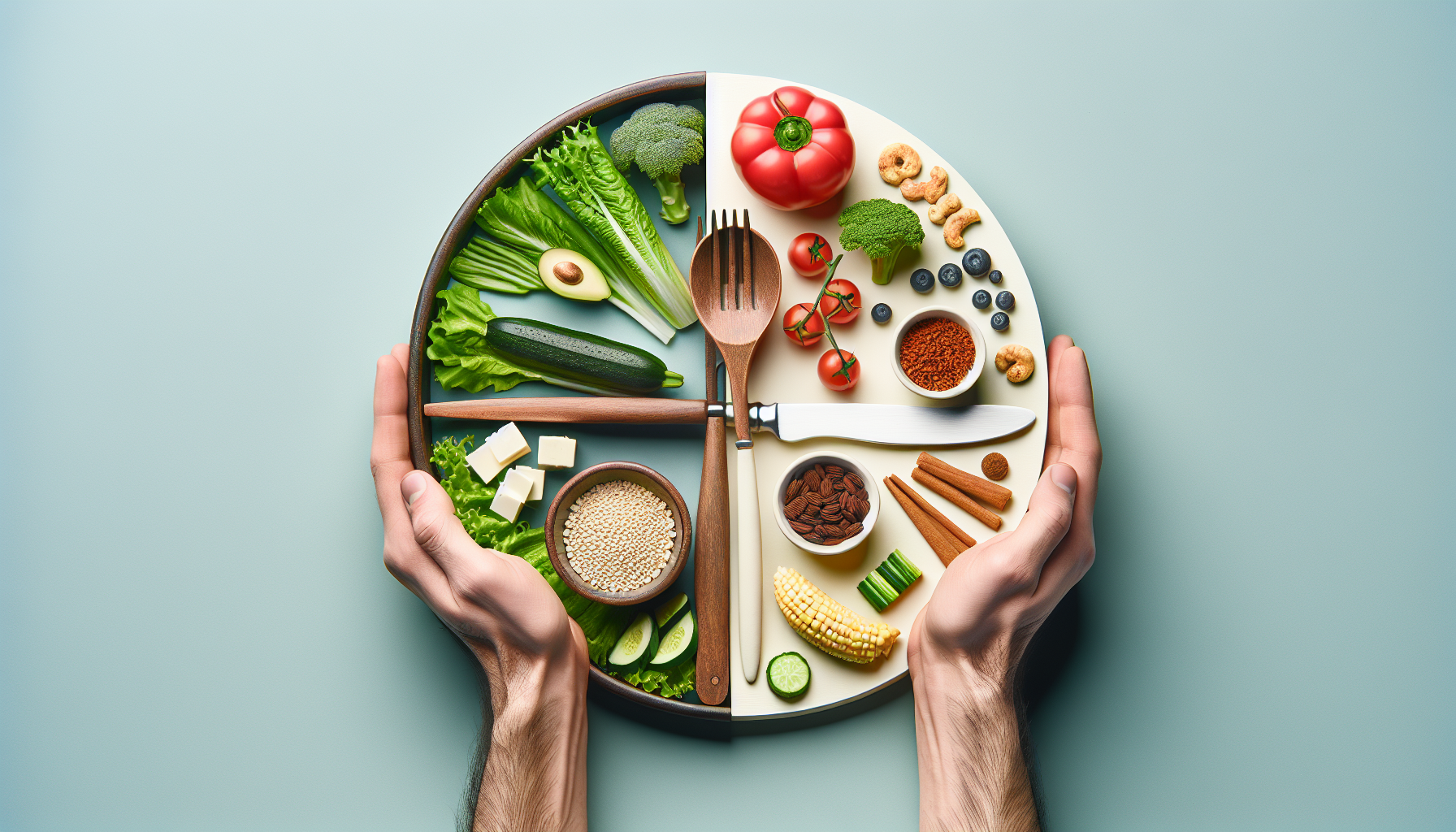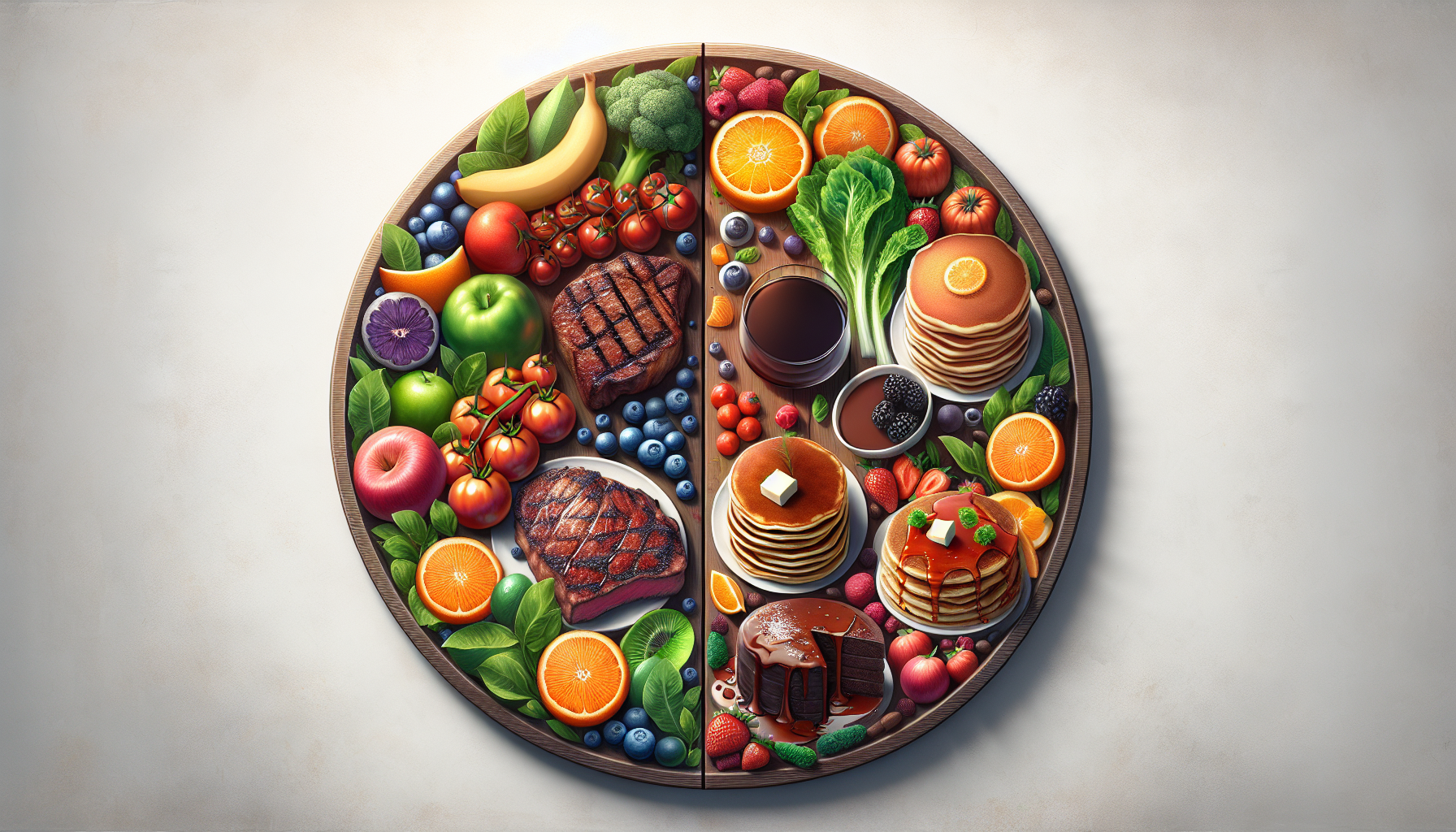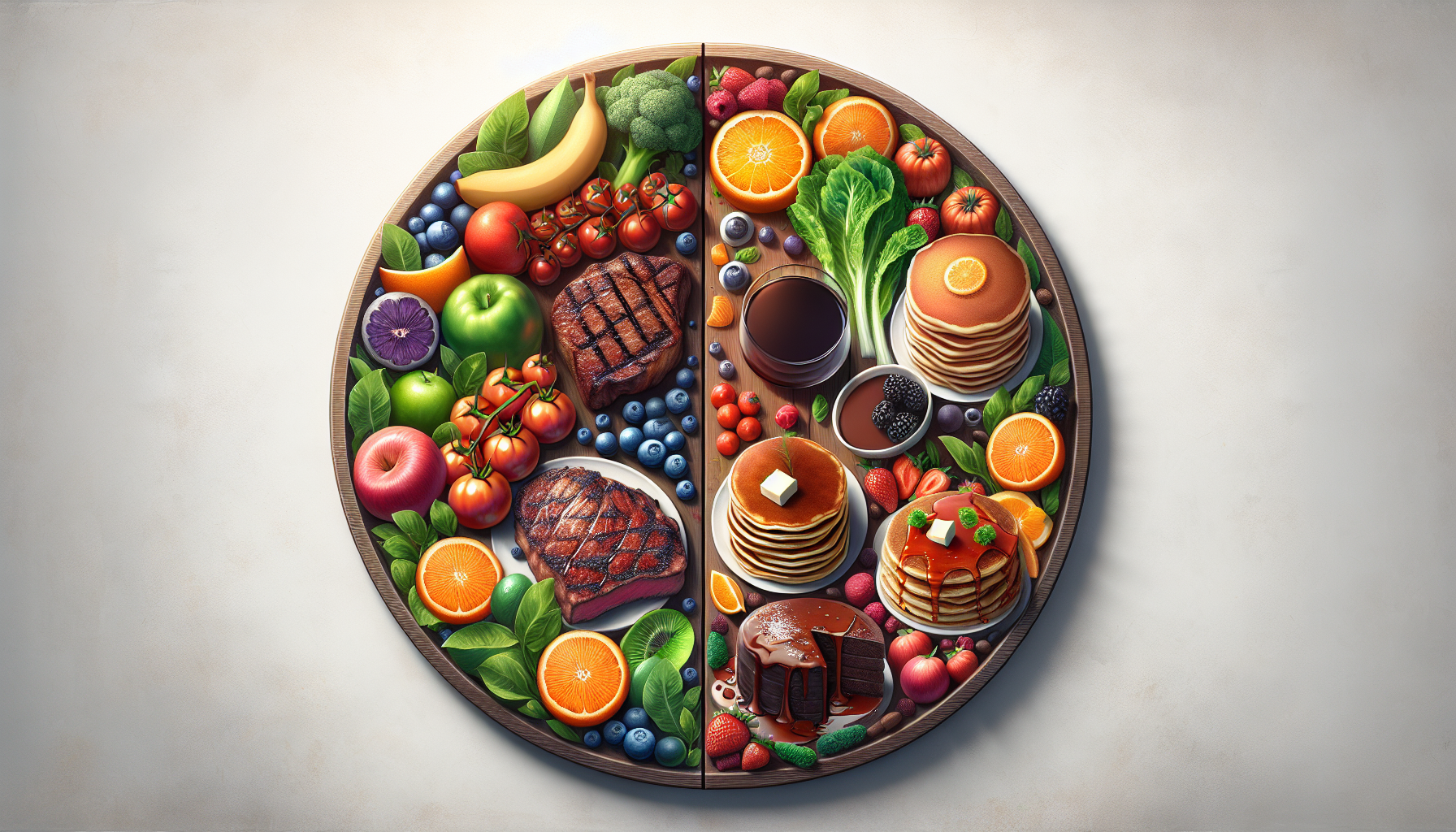Are you tired of resorting to unhealthy fast food when cooking for yourself? Do you find it challenging to strike a balance between eating nutritious meals and indulging in delicious treats? Look no further! In this article, we will provide you with some valuable tips on how to achieve the perfect harmony between nutrition and indulgence in your solo cooking adventures. Whether you’re a novice cook or an experienced chef, these practical suggestions will help you create mouth-watering meals that are both healthy and satisfying. So grab your apron and get ready to embark on a culinary journey where you can enjoy the best of both worlds!
Understanding Nutrition and Indulgence
The Importance of Nutrition in Solo Cooking
When it comes to solo cooking, prioritizing nutrition is essential for maintaining overall health and well-being. While it may be tempting to indulge in unhealthy foods, it is crucial to understand the importance of nourishing your body with nutrient-rich ingredients. Consuming a balanced diet ensures that your body receives the necessary vitamins, minerals, and macronutrients to function optimally.
The Role of Indulgence in Solo Cooking
While nutrition is vital, it is equally important to allow yourself indulgences from time to time. Indulgence can provide a sense of pleasure and satisfaction, making the cooking and eating experience more enjoyable. However, achieving a balance between nutrition and indulgence is key. By incorporating indulgent ingredients in moderation, you can still enjoy flavorful meals without compromising your health goals.
Challenges in Balancing Nutrition and Indulgence
Finding the right balance between nutrition and indulgence can be challenging, especially when cooking for yourself. It is easy to give in to convenience foods or dishes high in calories, as there might not be anyone to hold you accountable. Additionally, the lack of variety in solo meals can make it tempting to indulge in unhealthy options. However, by arming yourself with knowledge and adopting mindful practices, you can overcome these challenges and create a healthy and indulgent solo cooking routine.
Building a Balanced Pantry
Creating a Well-Stocked Pantry
A well-stocked pantry is the foundation of successful solo cooking. By having a variety of staple items readily available, you can whip up nutritious and delicious meals in no time. Essential pantry items may include whole grains, legumes, canned vegetables, spices, herbs, and cooking oils. Planning your meals and shopping for ingredients in advance ensures that you always have a well-stocked pantry to rely on.
Choosing Nutrient-Dense Ingredients
Incorporating nutrient-dense ingredients into your solo cooking is crucial for meeting your nutritional needs. Opt for fresh produce, lean proteins, whole grains, and healthy fats. These ingredients are rich in essential nutrients while being lower in calories. Experimenting with new ingredients and trying different cooking methods can make your dishes more exciting and nutritious.
Selecting Indulgent Ingredients
Indulgent ingredients have their place in solo cooking, but moderation is key. Instead of completely eliminating indulgent options, choose high-quality ingredients that bring more flavor to your meals without compromising nutrition. For example, opt for dark chocolate instead of milk chocolate or use a small amount of full-fat cheese instead of processed cheese. By being mindful of portion sizes and the frequency of indulgence, you can enjoy your favorite treats guilt-free.

Planning Balanced Meals
Understanding Macronutrients and Micronutrients
To create balanced meals, it is important to understand the role of macronutrients and micronutrients. Macronutrients, such as carbohydrates, proteins, and fats, provide energy and help build and repair tissues. Micronutrients, such as vitamins and minerals, are essential for various bodily functions. Incorporating a variety of macronutrients and micronutrients in your meals ensures you are getting a well-rounded nutrition.
Portion Control and Serving Sizes
Portion control plays a crucial role in balancing nutrition and indulgence. It is easy to overeat, especially when cooking for yourself. By practicing mindful portion control and being aware of appropriate serving sizes, you can enjoy a diverse range of foods without going overboard on calories. Utilize measuring cups, food scales, or visual cues to ensure that you are consuming appropriate portions.
Incorporating Fruits and Vegetables
Fruits and vegetables are packed with vitamins, minerals, and fiber, making them essential for a nutritious solo cooking routine. Aim to incorporate a variety of colorful fruits and vegetables into your meals, as each color represents different essential nutrients. You can enjoy them raw, steamed, roasted, or blended into smoothies to add flavor, texture, and nutritional value to your dishes.
Substituting Healthier Options
When planning your meals, consider substituting healthier options for calorie-dense ingredients. For example, swap white rice with quinoa or cauliflower rice for a nutrient boost. Replace creamy dressings with homemade vinaigrettes or Greek yogurt-based alternatives. These small adjustments can significantly reduce excessive calories while still maintaining the flavors you love.
Adding Flavor and Indulgence in Moderation
While nutrition is a priority, it is important to remember that indulgence has its place in solo cooking. Including flavorful ingredients like herbs, spices, and condiments can enhance the taste of your meals without adding excess calories. Additionally, allow yourself occasional indulgences by adding a small amount of your favorite sauce, cheese, or dessert to your meals. Balancing indulgence with nutritious ingredients ensures that you satisfy your cravings while nourishing your body.
Cooking Techniques for Balance
Healthy Cooking Methods
The cooking techniques you choose can significantly impact the nutritional value of your meals. Opt for healthier cooking methods such as baking, grilling, steaming, or sautéing instead of frying or deep-frying. These methods require minimal added fats and help retain the natural flavors and nutrients of the ingredients.
Reducing Unhealthy Fats and Oils
While healthy fats are essential for your body, it is important to limit your intake of unhealthy fats and oils. Use minimal amounts of oil when sautéing or baking and opt for healthier alternatives like olive oil or avocado oil. Reduce the consumption of saturated fats found in processed foods and replace them with healthier sources such as nuts, seeds, and fatty fish.
Avoiding Excessive Sodium
Excess sodium intake can lead to various health issues, including high blood pressure. Instead of relying on salt to enhance the flavor of your dishes, experiment with alternative seasonings like herbs, spices, and citrus juices. By gradually cutting back on sodium, you can develop a more sensitive palate and appreciate the natural flavors of the ingredients.
Using Herbs and Spices for Flavor
Herbs and spices are excellent additions to solo cooking, as they bring depth and complexity to your meals without adding extra calories. Experiment with different combinations of herbs and spices to discover unique flavor profiles that suit your taste preferences. Fresh herbs, like basil, mint, or cilantro, can be grown at home to ensure a ready supply when you need them.
Minimizing Added Sugars
Minimizing added sugars is crucial in maintaining a balanced diet. Excessive sugar consumption not only contributes to weight gain but also increases the risk of various health problems. When cooking solo, be mindful of added sugars in sauces, dressings, and packaged foods. Opt for natural sweeteners like honey or maple syrup and gradually reduce the amount used over time.

Exploring Nutrient-Rich Recipes
Protein-Packed Solo Meals
Protein is an essential nutrient that helps build and repair tissues, supports muscle growth, and keeps you feeling full and satisfied. Incorporating protein-rich ingredients like lean meats, poultry, fish, eggs, or plant-based sources like beans and legumes can make your solo meals more nutritious and fulfilling. Experiment with different recipes, such as stir-fries, salads, or grain bowls, to incorporate protein in a variety of ways.
Vibrant Salads and Vegetable Dishes
Salads and vegetable dishes are excellent choices for solo cooking, as they offer a wide array of nutrients and flavors. Use a combination of leafy greens, colorful vegetables, and flavorful dressings to create vibrant salads that are both satisfying and nutritious. Roasting or grilling vegetables adds depth to their flavors, making them a delightful side dish or main course option.
Whole Grain and Fiber-Rich Options
Incorporating whole grains into your solo cooking not only provides essential nutrients but also increases your fiber intake. Choose whole-wheat pasta, brown rice, quinoa, or whole grain bread for added nutritional value. These fiber-rich options help promote digestion, keep you feeling full, and stabilize blood sugar levels. Experiment with different whole grains to add variety and enhance the nutritional profile of your meals.
Healthy Snacks and Desserts
Snacks and desserts can still be enjoyable and nutritious when you choose the right ingredients. Opt for homemade snacks like energy balls, roasted chickpeas, or vegetable sticks with hummus for a healthy option. Satisfy your sweet tooth with fruit-based desserts, yogurt parfaits, or dark chocolate. By experimenting with different recipes, you can find delicious alternatives that nourish your body while indulging your cravings.
Meal Prep for Nutrition and Indulgence
Benefits of Meal Prepping for Solo Cooking
Meal prepping is a game-changer when it comes to maintaining a balanced solo cooking routine. By dedicating time to plan and prepare your meals in advance, you can ensure that you have nutritious options readily available, even on busy days. Meal prepping allows you to control portion sizes, customize your meals to meet your nutritional needs, and reduce the temptation of indulging in unhealthy options.
Planning and Batch Cooking
Start your meal prep by planning your menu for the week. Consider your nutritional goals, the recipes you want to try, and the ingredients you need. Once you have a plan, batch cook your meals by preparing larger quantities and portioning them into individual containers. This saves time during the week and makes it easier to stick to your balanced eating plan.
Freezing and Proper Storage
Freezing is a fantastic way to extend the shelf life of your meal prepped dishes and ensure they remain fresh and nutritious. Invest in quality freezer-safe containers or bags to store your meals. Label and date each container to keep track of what you have on hand. When it’s time to enjoy your prepped meals, simply defrost and reheat as needed. Proper storage and organization make meal prepping efficient and convenient.
Eating Mindfully and Moderation
Practicing Mindful Eating
Mindful eating is a practice that involves being fully present and attentive to the eating experience. When cooking and enjoying your meals solo, take the time to appreciate each bite and savor the flavors. Minimize distractions, such as screen time, and focus on the textures, aromas, and taste of the food. This practice not only enhances your enjoyment of meals but also helps regulate your hunger and fullness cues.
Listening to Hunger and Fullness Cues
Listening to your body’s hunger and fullness cues is crucial for maintaining a balanced eating routine. Before reaching for a snack or seconds, assess your level of hunger. Eat slowly, and pause periodically to gauge your level of satisfaction. Stop eating when you feel comfortably full, as overeating can lead to discomfort and unnecessary calorie intake.
Staying Mindful of Indulgence
While it is important to indulge in your favorite treats, staying mindful of the frequency and portion sizes is key to achieving balance. By savoring each bite and truly enjoying the indulgence, you can satisfy your cravings without overdoing it. Be aware of emotional eating triggers and find healthier alternatives or distractions to manage those feelings in a balanced way.
Seeking Inspiration and Support
Online Resources for Healthy Recipes
The internet is a treasure trove of healthy recipes that cater to various dietary preferences and restrictions. Explore reputable websites, food blogs, and social media platforms that focus on providing nutritious solo cooking ideas. Utilize online recipe databases that allow you to search for dishes based on specific nutrient content, cooking time, or ingredient availability. These resources can provide inspiration and help you diversify your meal options.
Cooking Communities and Forums
Joining cooking communities and forums dedicated to solo cooking can provide a wealth of knowledge and support. Engage with like-minded individuals who share your passion for balancing nutrition and indulgence. These communities often offer recipe exchanges, tips, and valuable insights from individuals who have successfully implemented healthy practices into their solo cooking routines.
Cooking Challenges and Accountability
Participating in cooking challenges or seeking accountability partners can help keep you motivated and on track. Look for challenges or programs that focus on creating balanced meals for solo cooking. These challenges often provide meal plans, recipes, and a community of individuals pursuing similar goals. Accountability partners can offer support, keep you accountable, and provide encouragement throughout your journey.
Finding Balance in Dining Out
Choosing Healthier Restaurant Options
Dining out does not have to mean compromising on nutrition. When eating at a restaurant, browse the menu for healthier options. Look for dishes that incorporate lean proteins, plenty of vegetables, and whole grains. Avoid deep-fried or heavily processed foods and opt for grilled, baked, or steamed alternatives.
Smart Ordering and Portion Control
Smart ordering and portion control can help you strike a balance between indulgence and nutrition when dining out. Skip the super-sized portions and opt for smaller portions or share larger dishes with a dining partner. Choose dishes that incorporate a variety of flavors, textures, and food groups to ensure a well-rounded meal.
Making Indulgent Choices Mindfully
Occasionally, you may find yourself craving more indulgent options while dining out. Instead of depriving yourself, approach indulgence mindfully. Enjoy your favorite dish, but be conscious of portion sizes and the overall balance of your meal. Consider filling half your plate with vegetables or ordering a side salad to ensure you are getting some nutritional value alongside your indulgence.
Adapting to Individual Needs and Preferences
Considering Dietary Restrictions or Allergies
Individuals with dietary restrictions or allergies may face unique challenges when it comes to balancing nutrition and indulgence. However, with careful planning and ingredient substitutions, it is still possible to create delicious and nutritious meals. Research alternative ingredients, explore specialized cookbooks, or consult with a registered dietitian to find suitable options that cater to your specific needs.
Modifying Recipes for Specific Diets
Modifying recipes to suit specific diets is essential for maintaining a balanced solo cooking routine. Whether you follow a vegetarian, vegan, gluten-free, or low-sodium diet, there are countless recipe modifications available. Experiment with different ingredient swaps, alternative cooking techniques, and seasonings to tailor recipes to your specific dietary requirements.
Adjusting Indulgence Levels
Balancing nutrition and indulgence is highly personalized, and everyone has different preferences when it comes to indulgences. It is essential to find what works for you and adjust the indulgence levels accordingly. Some individuals may thrive with small indulgences every day, while others may prefer occasional larger indulgences. Listen to your body, monitor how indulgence affects your overall well-being, and make adjustments that align with your goals and preferences.
In conclusion, finding balance in solo cooking requires an understanding of nutrition, the role of indulgence, and the challenges that come with creating balanced meals. By building a well-stocked pantry, planning balanced meals, practicing cooking techniques for balance, exploring nutrient-rich recipes, and adapting to individual needs, you can achieve a healthy and indulgent solo cooking routine. Remember to approach your meals mindfully, seek inspiration and support, find balance when dining out, and adjust your indulgence levels according to your personal preferences. With these tips and a friendly approach to your solo cooking journey, you can enjoy nutritious and delicious meals while savoring the joys of indulgence.
